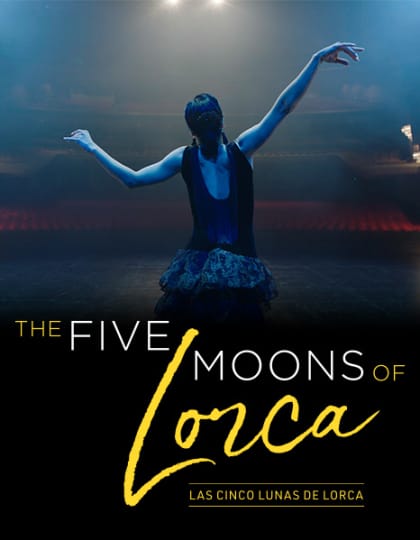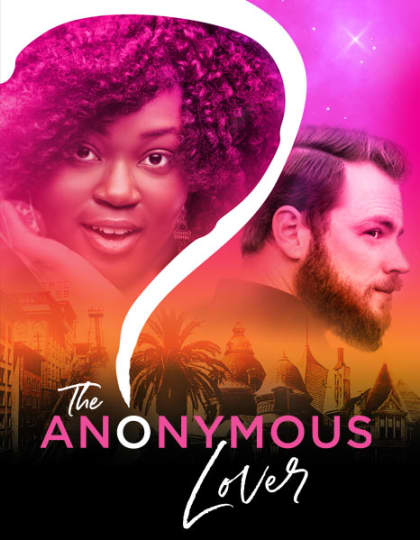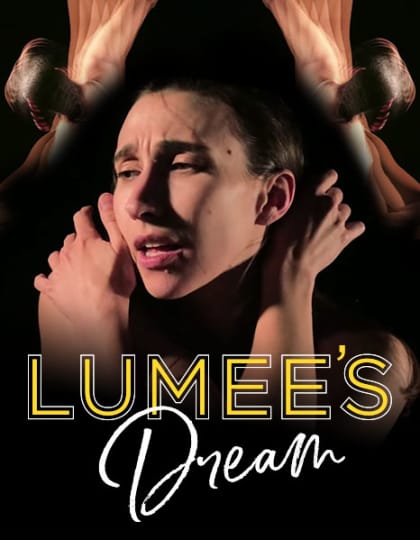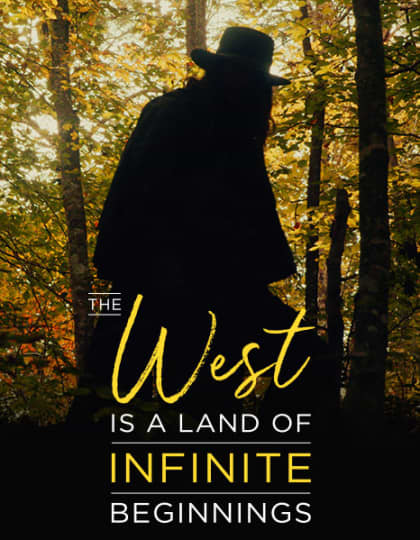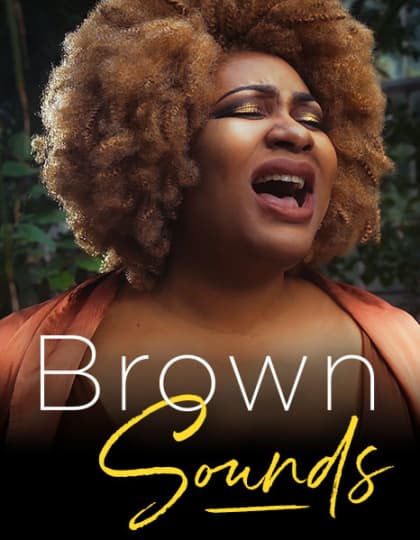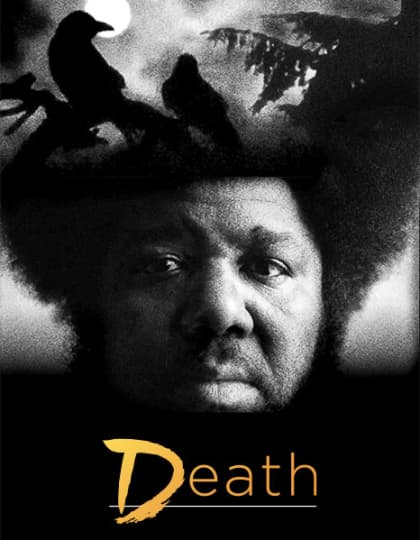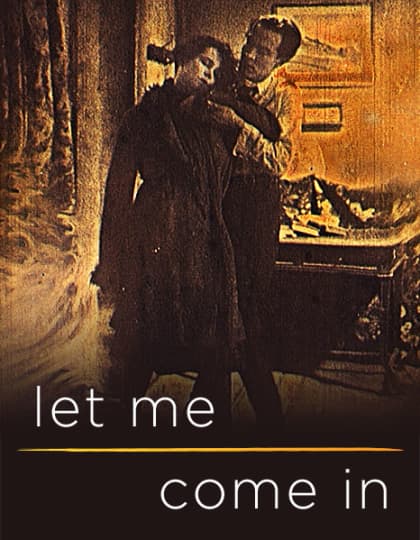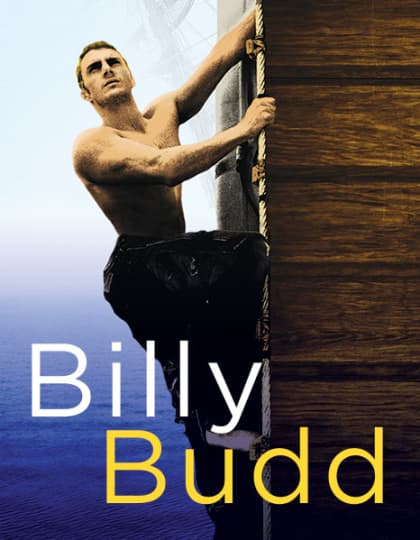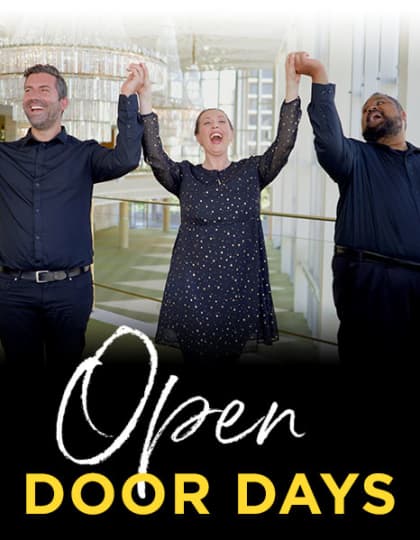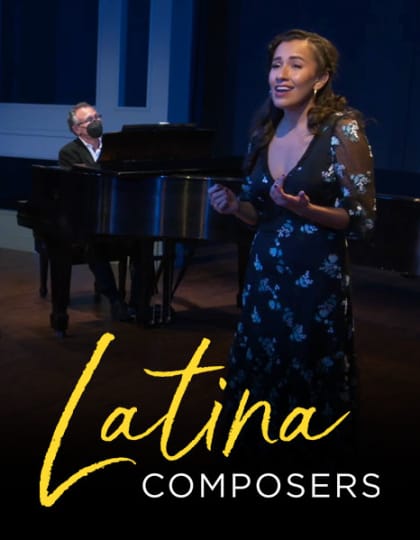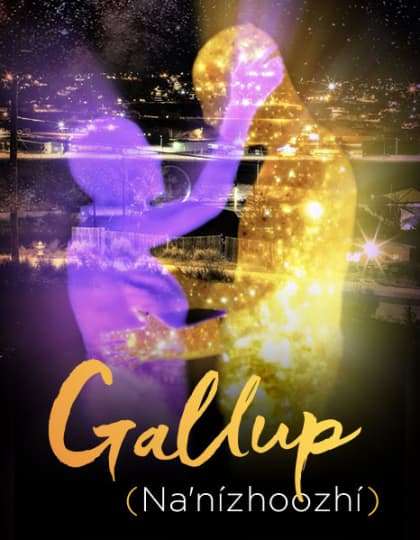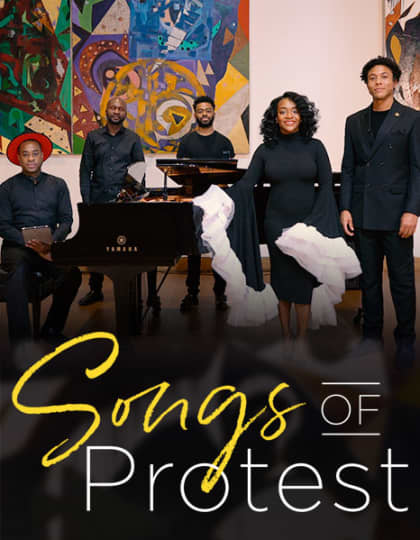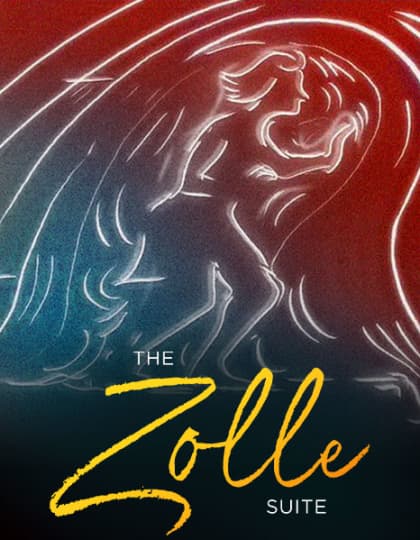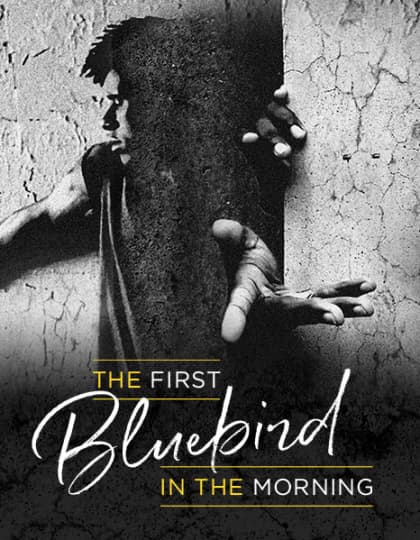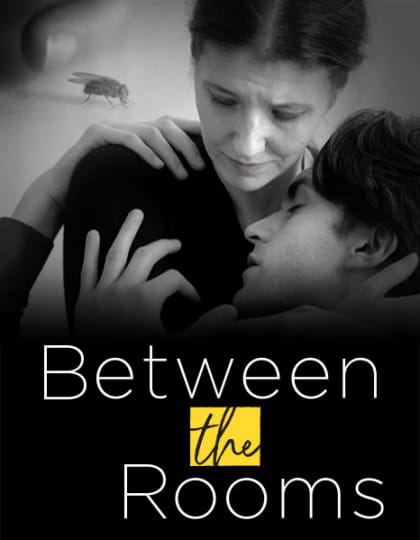A powerful new film featuring seminal poetic works from three influential Black poets.
We Hold These Truths is a musical and cinematic triptych featuring composer Tamar-kali's setting of three iconic poems from the turn of the 20th century through the Harlem Renaissance: Paul Laurence Dunbar's "We Wear the Mask," Langston Hughes's "I, Too" and Claude McKay's "If We Must Die."
A striking new film by dream hampton (director of the Peabody-winning and Emmy-nominated film Surviving R. Kelly), We Hold These Truths stands as both an affirmation of wonder and joy, as well as a testimony to the vigil kept for the full realization of liberty.
The voices of these poets, raised in the past, echo through generations—from colored, to negro, to Black and African American—in a modern-day landscape where the watch continues.
"Tamar-kali is a second-generation musician whose music truly defies boundaries—and really traverses the spectrum from her unique alt-rock sound...to more orchestral pieces"
Artists
- Composer
- Tamar-kali
- Filmmaker
- dream hampton
- Poet
- Paul Laurence Dunbar
- Poet
- Langston Hughes
- Poet
- Claude McKay
- Conductor
- Anthony Parnther
- Tenor
- Ashley Faatoalia
- Baritone
- Cedric Berry
- Violin
- Curtis Stewart
- Vocal Ensemble
- Selah Gospel Choir
- Spoken Word Artist
- Samuel Getachew
Tamar-kali
Composer
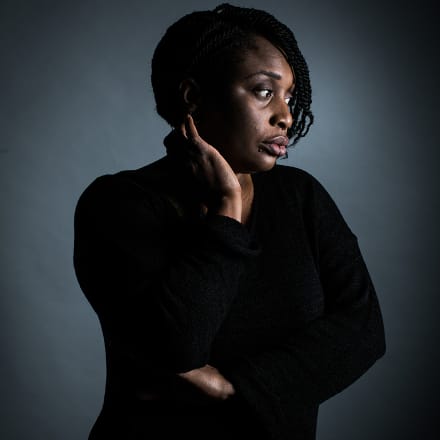
From: Brooklyn, New York. LA Opera: the Digital Short We Hold These Truths (2021).
Brooklyn born and bred artist Tamar-kali is a second-generation musician with roots in the coastal Sea Islands of South Carolina. As a composer, Tamar-kali has defied boundaries to craft her own unique alternative sound.
2017 marked her debut as a film score composer. Her score for Dee Rees’ Oscar-nominated Mudbound garnered her the World Soundtrack Academy’s 2018 Discovery of the Year Award and has been classified by Indiewire as one of the 25 Best Film Scores of the 21st century.
2019 was a hallmark year for her work as a composer. In addition to debuting her first symphonic commission, she scored four films, three of which were featured at the Sundance Film Festival 2020. They include Dee Ree’s The Last Thing He Wanted, Kitty Green’s The Assistant and Josephine Decker’s psychological drama Shirley; the latter's soundtrack was named The Guardian’s Contemporary Album of the Month in June 2020. The fourth film was the documentary John Lewis: Good Trouble.
2021 promises a range of projects from opera commissions and a new solo EP.
Learn more at Tamar-kali.com.
Photo credit: Felix van Groeningen
dream hampton
Filmmaker
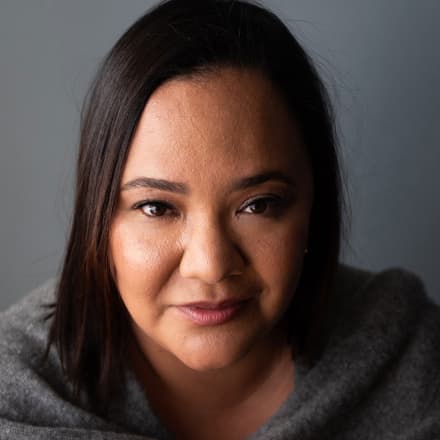
From: Detroit, Michigan. LA Opera: the Digital Short We Hold These Truths (2021, debut).
dream hampton is an award-winning filmmaker and writer from Detroit. Her most recent works include the Frameline feature documentary Treasure (2015), the BET docu-series Finding Justice (2019) and Lifetime's Emmy-nominated Surviving R. Kelly (2019), which broke ratings records and earned a Peabody Award. In 2019, hampton was named one of Time's 100 most influential people in the world.
Learn more at dreamhampton.com.
Paul Laurence Dunbar
Poet
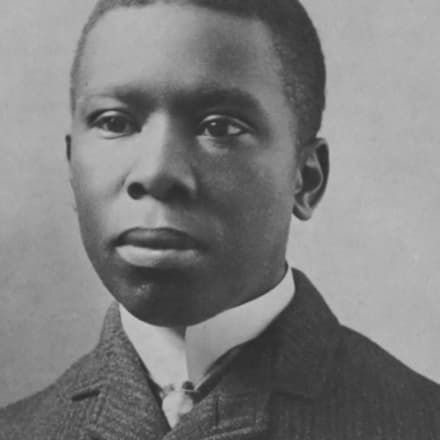
From: Dayton, Ohio. LA Opera: His poetry is featured in the Digital Shorts Death (2021) and We Hold These Truths (2022).
Paul Laurence Dunbar was born in Dayton, Ohio, on June 27, 1872, the son of two former slaves. His short and miraculous life ended at age 33, after a painful battle with tuberculosis.
In that time, he wrote a dozen books of poetry, four collections of short stories, five novels, and a play, providing both a history and a celebration of Black life at the turn of the century. But it was “dialect” poems—employing the form and cadence of Black speech—that made him famous and when placed alongside his works of "literary” English, suggested the duality of the Black experience.
As the nation's preeminent Black poet, Dunbar was part of the first generation of African Americans to grow up after Emancipation and corresponded regularly with W.E.B. Du Bois, Booker T. Washington and Frederick Douglass, who described him as “the most promising young colored man in America.” He traveled the world, attending both of President Theodore Roosevelt's inaugurations and Queen Victoria's Diamond Jubilee, but to his frustration, Dunbar struggled to be recognized as a writer belonging to the same tradition as John Keats and William Shakespeare and rejected his own manner of speech.
Decades later, his work would inspire a new generation of Black writers, most notably, Langston Hughes and Maya Angelou, who borrowed a line from Dunbar’s poem "Sympathy" for the title of her autobiography, I Know Why the Caged Bird Sings.
As Dunbar lay dying in his study on February 9, 1906, he read the 23rd Psalm aloud to his mother. His final words were “Yea, though I walk through the valley of the shadow of death.”
Langston Hughes
Poet
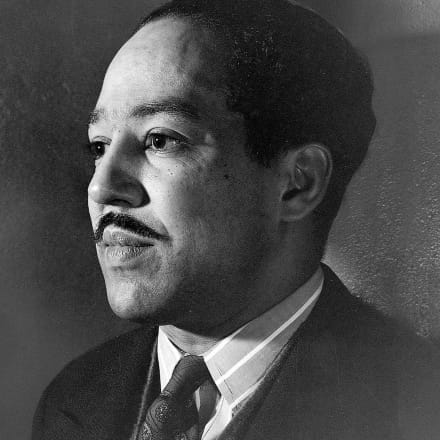
Born: Joplin, Missouri, 1901. Died: New York City, 1967. LA Opera: His poetry is featured in the Digital Short We Hold These Truths (premiering March 4, 2022).
James Mercer Langston Hughes's birth year was revised from 1902 to 1901 after new research from 2018 uncovered that he had been born a year earlier. His parents divorced when he was a young child, and his father moved to Mexico. He was raised by his grandmother until he was 13, when he moved to Lincoln, Illinois, to live with his mother and her husband, before the family eventually settled in Cleveland, Ohio. It was in Lincoln that Hughes began writing poetry. After graduating from high school, he spent a year in Mexico followed by a year at Columbia University in New York City. During this time, he worked as an assistant cook, launderer, and busboy. He also travelled to Africa and Europe working as a seaman. In November 1924, he moved to Washington, D.C. Hughes’s first book of poetry, The Weary Blues, was published by Alfred A. Knopf in 1926 with an introduction by Harlem Renaissance arts patron Carl Van Vechten. Criticism of the book from the time varied, with some praising the arrival of a significant new voice in poetry, while others dismissed Hughes's debut collection. He finished his college education at Lincoln University in Pennsylvania three years later. In 1930 his first novel, Not Without Laughter (Knopf), won the Harmon gold medal for literature.
Hughes, who claimed Paul Laurence Dunbar, Carl Sandburg, and Walt Whitman as his primary influences, is particularly known for his insightful portrayals of Black life in America from the twenties through the sixties. He wrote novels, short stories, plays and poetry, and is also known for his engagement with the world of jazz and the influence it had on his writing, as in his book-length poem Montage of a Dream Deferred (Holt, 1951). His life and work were enormously important in shaping the artistic contributions of the Harlem Renaissance of the 1920s. Unlike other notable Black poets of the period such as Claude McKay, Jean Toomer, and Countee Cullen, Hughes refused to differentiate between his personal experience and the common experience of Black America. He wanted to tell the stories of his people in ways that reflected their actual culture, including their love of music, laughter and language itself alongside their suffering.
The critic Donald B. Gibson noted in the introduction to Modern Black Poets: A Collection of Critical Essays (Prentice Hall, 1973) that Hughes “differed from most of his predecessors among Black poets… in that he addressed his poetry to the people, specifically to Black people. During the twenties when most American poets were turning inward, writing obscure and esoteric poetry to an ever decreasing audience of readers, Hughes was turning outward, using language and themes, attitudes and ideas familiar to anyone who had the ability simply to read... Until the time of his death, he spread his message humorously—though always seriously—to audiences throughout the country, having read his poetry to more people (possibly) than any other American poet.”
In addition to leaving us a large body of poetic work, Hughes wrote 11 plays and countless works of prose, including the well-known “Simple” books: Simple Speaks His Mind (Simon & Schuster, 1950); Simple Stakes a Claim (Rinehart, 1957); Simple Takes a Wife (Simon & Schuster, 1953); and Simple's Uncle Sam (Hill and Wang, 1965). He edited the anthologies The Poetry of the Negro and The Book of Negro Folklore, wrote an acclaimed autobiography, The Big Sea (Knopf, 1940), and cowrote the play Mule Bone (HarperCollins, 1991) with Zora Neale Hurston.
Langston Hughes died of complications from prostate cancer on May 22, 1967, in New York City. In his memory, his residence at 20 East 127th Street in Harlem has been given landmark status by the New York City Preservation Commission, and East 127th Street has been renamed “Langston Hughes Place.”
Claude McKay
Poet
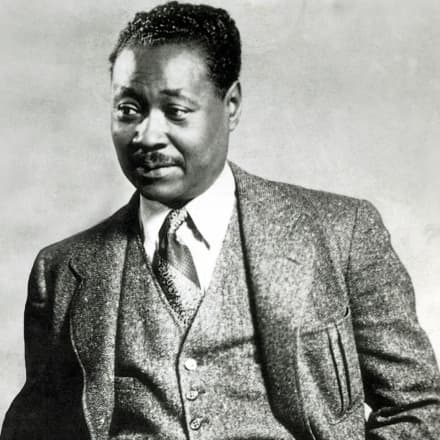
Born: Clarendon, Jamaica, 1889. Died: Chicago, Illinois, 1948.
Claude McKay was educated in Jamaica by his older brother, who possessed a library of English novels, poetry and scientific texts.
In 1912, McKay published a book of verse called Songs of Jamaica (Gardner), recording his impressions of Black life in Jamaica in dialect. That same year, he traveled to the United States to attend Tuskegee Institute in Alabama. He remained there only a few months, leaving to study agriculture at Kansas State University.
In 1917, he published two sonnets, “The Harlem Dancer” and “Invocation,” and later used the form in writing about social and political concerns from his perspective as a Black man in the United States. McKay also wrote on a variety of subjects, from his Jamaican homeland to romantic love, with a use of passionate language.
During the twenties, McKay developed an interest in communism and traveled to Russia and then to France, where he met Edna St. Vincent Millay and Sinclair Lewis. In 1934, McKay moved back to the United States and lived in Harlem, New York. Losing faith in communism, he turned his attention to the teachings of various spiritual and political leaders in Harlem, eventually converting to Catholicism.
McKay’s viewpoints and poetic achievements in the earlier part of the twentieth century set the tone for the Harlem Renaissance and gained the deep respect of younger Black poets of the time, including Langston Hughes. He died on May 22, 1948.
Anthony Parnther
Conductor
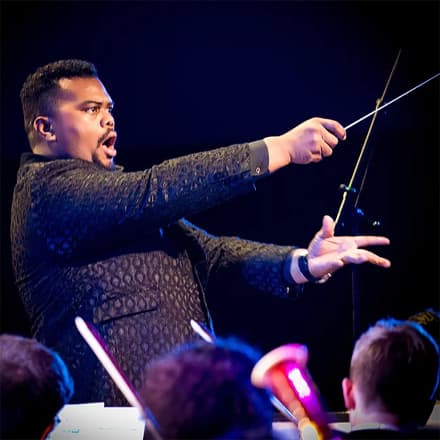
LA Opera: conductor of the Digital Short We Hold These Truths (2021, debut)
American conductor Anthony Parnther is the Music Director and Conductor of the San Bernardino Symphony Orchestra and the Southeast Symphony & Chorus in Los Angeles. Anthony also serves as the Artistic Director of Musicians at Play and as Resident Conductor of the newly established Orchestra US.
Anthony has conducted artists spanning every musical genre including Joshua Bell, Jessye Norman, Yundi Li, Lynn Harrell, Frederica von Stade, Roderick Williams, The Canadian Brass, Jennifer Holliday, Kanye West, Imagine Dragons, Omar Appollo, and Alan Walker. Recent guest conducting engagements include the Los Angeles Philharmonic, Chineke! Orchestra, Simfònica de Barcelona i Nacional de Catalunya, Tulsa Symphony Orchestra, Eugene Symphony, Toledo Symphony, Hear Now Music Festival, BrightworkNewMusic, UCLA Philharmonia, the Pittsburgh Microtonal Festival, Hollywood Chamber Orchestra, and the World Opera Forum in Madrid, Spain.
Over the last decade, Anthony has conducted the Hollywood Studio Symphony on a lengthy list of the top film, television, and video game entities in the world. This includes Star Wars: The Mandalorian, Tenet, Little, The Hunt, Fargo, The Way Back, The Night Of, Ghostbusters: Afterlife and League of Legends. He has conducted hundreds of sessions for a long list of media composers including Ludwig Göransson, Jeff Russo, Rob Simonsen, Nathan Barr, and Germaine Franco. Anthony has accepted invitations with orchestras internationally to conduct live film concerts, particularly the scores of John Williams, Michael Giacchino, and Jerry Goldsmith. His live orchestral concert appearances for Riot Games' League of Legends in Barcelona, Beijing, Seoul and Los Angeles are among the most viewed symphonic concerts in the world, with live audiences of 50,000+ spectators and a viewership that outpaces the World Series, with approximately 100 million live streaming each League of Legends Finals Opening Ceremony concert.
Recognized as a leading authority on orchestral works by minority and women composers, Anthony has restored and performed orchestral works by Florence Price, Zenobia Powell Perry, George Walker, Margaret Bonds, William Grant Still, Duke Ellington, and Samuel Coleridge Taylor. He has given premieres of works by Errollyn Wallen, John Wineglass, Gary Powell Nash, and Marian Harrison. He has commissioned, premiered, and recorded works by sixty living Black composers such as Renee Baker, James Wilson, Phillip Herbert, Daniel Kidane, Chanda Dancy and James Newton. He was profiled by Los Angeles' KCET/TV as a "Local Hero" in 2015 for his extensive community outreach and advocacy for the performance of works by Black, Latino, and Women artists.
Anthony studied music performance at Northwestern University and continued his musical studies at Yale University where he studied orchestral conducting with Lawrence Leighton Smith and Otto Werner Mueller. In addition, Anthony studied applied voice and choral conducting with Thomas Jenrette and wind conducting with Roxanne Haskill, the retired director of the Marine Corps Music Program. He also received guidance and inspiration from Cliff Colnot, David Webb, Lafe Cook, W. Francis McBeth, and Frank Battisti. He resides in Los Angeles and Palm Springs.
Learn more at AnthonyParnther.com.
Ashley Faatoalia
Tenor
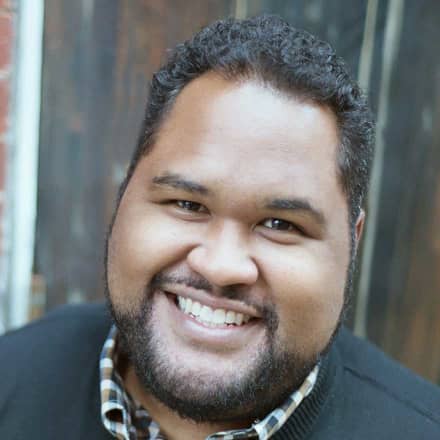
Tenor Ashley Faatoalia is a versatile, young artist born and raised in Los Angeles. Ashley studied vocal performance at Chapman University and has been singing professionally since that time. Opera News calls his singing “hauntingly beautiful” crediting him with “a voice of winning purity and variety of expression” and The San Francisco Chronicle calls him “Sweet-toned.” Ashley's recent engagements include performances as: Bobby McCray in the world premiere of the Pulitzer Prize-winning opera The Central Park Five with Long Beach Opera, The Crab Man in Porgy & Bess with Seattle Opera, Lyric Tenor in EUROPERAS with LAPhil, and his debut as Marco Polo in the Emmy-Award-winning, Pulitzer Prize-nominated Invisible Cities with The Industry. For the last ten years, Ashley has also had the fortune of working with LA Opera Connects going into the community and sharing music with all who wish to enjoy. (AshleyFaatoalia.com - follow him @ashthetenor)
Open Door Days
Opera Tales
Cedric Berry
Baritone

Award-winning bass-baritone Cedric Berry's experience spans opera, Broadway, American Song Book, jazz and gospel. He has performed with LA Opera, The Industry Opera, Long Beach Opera, Savonlinna Opera Festival of Finland, Banlieurs Bleues Festival of France and the Ravinia Music Festival, to name a few. He has appeared with Pacific Symphony, Arizona Symphony, Santa Fe Symphony, Luckman Jazz orchestra, Pasadena Pops Orchestra, California Philharmonic, Los Angeles Philharmonic and the Telemann Chamber Orchestra of Japan. He has also been the recipient of several awards including first place in the Metropolitan Opera Western Region Competition. Notable recent engagements include the role of Yusef in the world premiere of the Central Park Five opera. (CedricBerry.com)
Music as Medicine
Curtis Stewart
Violin
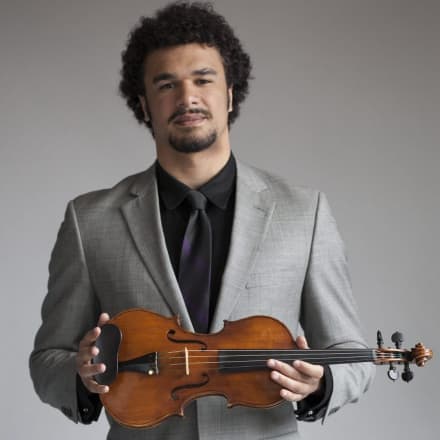
From: New York City, New York. LA Opera: featured soloist in the Digital Short We Hold These Truths (premiering March 4, 2022).
Genre bending violinist Curtis Stewart enjoys an eclectic career bouncing between concerts in various realms of music: from MTV specials with Wyclef Jean and sold out shows at Madison Square Garden with Stevie Wonder, to stints at the Kennedy Center with the Jimmy Heath Big Band and performance installations at the Whitney Museum, the Guggenheim Museum, and Museum of Modern Art in NYC.
Curtis has performed as a soloist at Lincoln Center, and Carnegie Hall, made chamber music appearances at the Metropolitan Museum of Art, and the Newport Jazz Festival, holding his audiences "spellbound" with his "warm, clear sound…sparkling rhythmic energy," "soulful improvisation" and "prodigious technique" (New Amsterdam Times, The Morning Call, SoundWordSight).
Born into a family of “avante” leaning musicians, Curtis’ delves into the human qualities of the violin; its infinite shades of expression, tapping into the deep connections and conflicts of our humanity across time, and culture. His father, avante jazz tuba pioneer Bob Stewart and mother Elektra Kurtis, soulful Greek/Jazz violinist formed the framework of his sound world through daring improvisation, rigorous western classical training, and conceptual composition. Curtis’ mission is to champion the contemporary, and search for connection in this seemingly chaotic and disperse world, morphing the seemingly divergent into the complementary and symbiotic.
Curtis has received special mention from JazzTimes and Downbeat magazine. STRAD magazine called Curtis “a gem of string player, among the excellent musicians, whose impressive work contributed to many of the night’s high points...his swinging flights were among the most memorable.” An avid teacher, he currently teaches at the Laguardia High School for Music & Art and Performing Arts, and is on faculty at the Jazz @ Lincoln Center Jazz Academy.
His ensembles realize a vision to find powerful connections between styles, cultures and musics. "PUBLIQuartet," was finalist in the 2013 Concert Artist Guild Competition, winner of the Sylvia Ann Hewlett Adventurous Artist Prize. His spoken word trio, "The Mighty Third Rail" won "Best Music" and "Best Innovation" at the Edinburgh International Fringe Festival. His ensembles perform at the Blue Note, National Public Radio, Rochester Jazz Festival, NYC SummerStage, the PUBLIC Theater, Nuyorican Poet's Cafe, and many others frequently around the nation.
Curtis has worked with today's forward thinking musicians including Henry Threadgill, Jason Moran, members of International Contemporary Ensemble, Billy Childs, members of Snarky Puppy, Don Byron, Linda Oh, Ari Hoenig, Matt Wilson, Jason Lindner, Edmar Casteneda, among many others.
Mentors include members of the Muir, Juilliard, Orion, Mendelssohn, Tokyo, American, Dedalus, Boromeo, Brentano, Uptown, and Turtle Island String Quartets, composers Joan Tower, Marcos Balter, Nadia Sirota, and Butch Morris, violinists Mark Steinberg, Lynn Blakeslee at the Eastman School of Music. Curtis also has a BA of Mathematics from the University of Rochester.
A supporter and practitioner of many styles of music, Curtis strives to expand and blend all the elements of his stylistic and expressive range, forging a unique and relevant voice in New York’s boundless music scene.
Learn more at CurtisJStewart.com.
Selah Gospel Choir
Vocal Ensemble
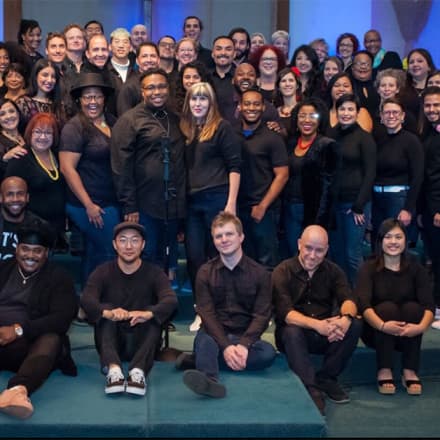
From: Los Angeles. LA Opera: featured in the Digital Short We Hold These Truths (2021, debut).
Selah Gospel Choir is a Black and women-led community performing arts organization that serves Los Angeles County under the fiscal sponsorship of Fulcrum Arts’ Emerge program, a 501(c)(3) that provides resources, communication services, and other support to artists and cultural organizations to further their artistic endeavors.
Founded in 2007, Selah Gospel Choir has cemented itself as a space for people who want to sing gospel music birthed by the spirit of the Black church and the ancestry of Black community but are either unable to find it in their home place of worship or do not identify with being in a church at all. Gospel music was introduced to the mainstream through the radically unifying activism of the 1960’s Civil Rights Movement. That collectivist spirit is the foundation of our mission to uplift and strengthen our communities through an individual connection by singing inspiring, soul stirring gospel music. Rooted in our mission, Selah Gospel Choir’s primary goals are to make gospel music available to all who wish to sing it; improve musicianship among our singers with focus on ear training, music theory, rhythm and movement; and share the good news by making a joyful noise to broad audiences via our bi-annual concerts, community events and various other performing and recording opportunities.
Selah Gospel Choir is not directly connected to any religious organization, yet the religious/spiritual makeup of our singers is broad and inclusive. Our singers are diverse across the identities of race, age, gender, sexuality, ethnicity and ability—and there is no audition requirement to join. It is core to our culture that all who enter our community are welcomed and shown respect and welcome and show respect to others. Circling around central values such as love, intersectionality and community, Selah Gospel Choir demonstrates these values as they sing for a purpose greater than themselves. This vibrant and challenging ensemble strives to remain authentic to the traditional and contemporary forms of gospel music.
Learn more at SelahGospelChoir.com.
Samuel Getachew
Spoken Word Artist
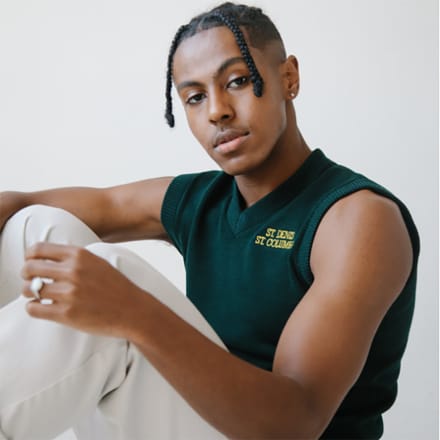
From: Oakland, California. LA Opera: the Digital Short We Hold These Truths (2021, debut).
Samuel Getachew is a 18-year-old spoken word poet, writer and model.
Using poetry as a way to shine light on contemporary issues as well as an personal outlet for emotion, Samuel has had the opportunity to perform his poetry in places ranging from Google's Incarceration Summit to the Lollapalooza Music Festival, and much more.
His poetry has garnered over a million cumulative views online, and he and his poetry have been featured in The New York Times, The East Bay Express, Refinery29, National Public Radio (NPR), KQED, KTVU News, Voice of America, and more. His opinion writing and reporting have been published in The New York Times, The Washington Post, Teen Vogue, KQED Arts and Culture, The East Bay Express, and more.
Offstage, Samuel is also a freelance model, and has appeared in i-D magazine and in campaigns for American Eagle. He will attend Yale University in the fall of 2021.
Learn more at SamuelGetachew.com.
Awards and Honors:
2017, 2018, and 2019 Youth Speaks Teen Poetry Slam Grand Champion
2019 Yerba Buena Center for the Arts 100 Honoree
2019 Oakland Youth Poet Laureate
2020 West Coast Youth Poet Laureate
2020 National Youth Poet Laureate Finalist
2020 John Swett Award for Media Excellence
2019, 2020, and 2021 YoungArts Winner in Spoken Word
2021 YoungArts Winner in Creative Nonfiction
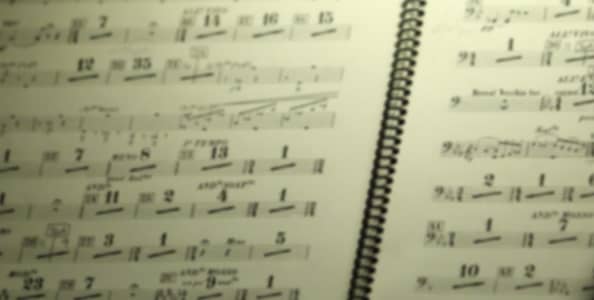
A Note from Composer Tamar-kali

A Note from Composer Tamar-kali
"We hold these truths to be self-evident, that all men are created equal, that they are endowed by their Creator with certain unalienable Rights, that among these are Life, Liberty and the pursuit of Happiness.” —United States Declaration of Independence, 1776
I represent the fourth generation in my family born free of chattel slavery here in America. Though my roots predate the formation of the United States as a nation; my ancestors were not included in the founders' vision. Their Declaration of Independence established self-realization for a small percentage of their fellow former colonists.
They had the audacity to dream big and project lofty ideals that they themselves were unable to live by. They created a government embodied in the Constitution that provided the framework for a truly equitable nation. Those who came before me, who had yet to taste freedom, held fast to this promise.
This piece is written at a moment in the 21st century where a segment of our nation bristles at the thought of progress and there continues to be a debate about how far we have come and whether or not change is being pushed upon the populace too hastily.
I thought of the rich legacy upon which I stand and felt moved to provide context for those unfamiliar. The first wave of the Civil Rights Movement in America dates back to the late 1800s. The thought that more than a century later “these truths” are still unattainable for a portion of our population seems unconscionable.
I hold these works from Paul Laurence Dunbar, Langston Hughes and Claude McKay to be self-evident in their distinguished provenance and continued relevance that this nation has fallen short of protecting for all its citizens Life, Liberty and the pursuit of happiness.
We are long overdue to see “these truths” made manifest.
This project is generously supported by a consortium of donors to LA Opera's Contemporary Opera Initiative, chaired by Nancy and Barry Sanders.

